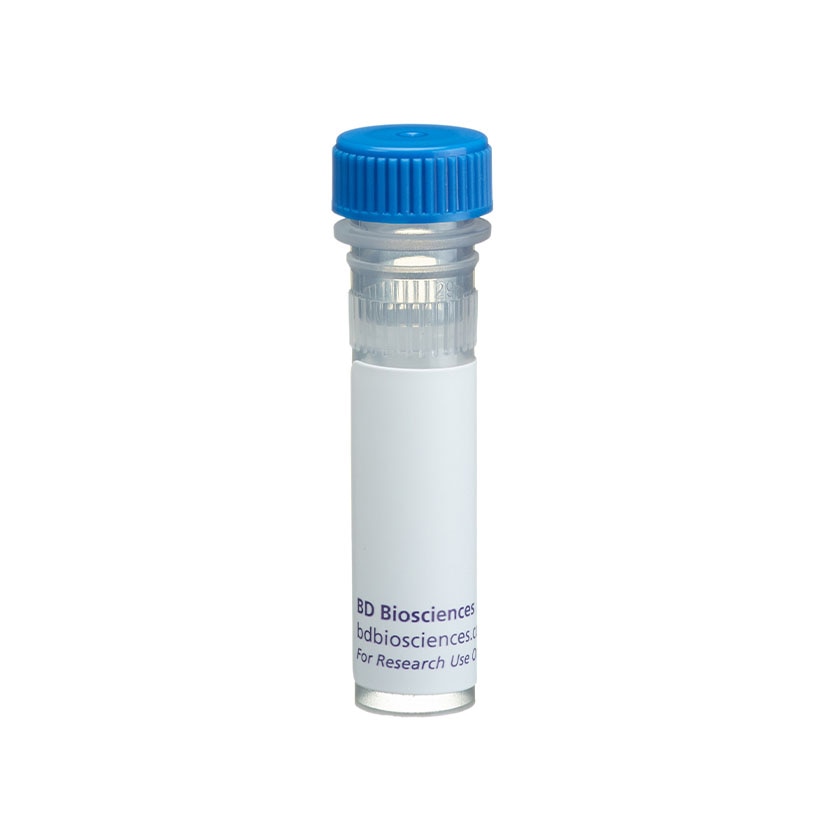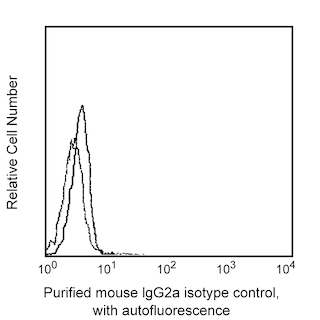Old Browser
Looks like you're visiting us from {countryName}.
Would you like to stay on the current country site or be switched to your country?




Profile of CD244 (2-69) reactivity on peripheral blood lymphocytes analyzed by flow cytometry. Second step staining with Cat. No. 555988.


BD Pharmingen™ Purified Mouse Anti-Human CD244

Regulatory Status Legend
Any use of products other than the permitted use without the express written authorization of Becton, Dickinson and Company is strictly prohibited.
Preparation And Storage
Product Notices
- Since applications vary, each investigator should titrate the reagent to obtain optimal results.
- Please refer to www.bdbiosciences.com/us/s/resources for technical protocols.
- Caution: Sodium azide yields highly toxic hydrazoic acid under acidic conditions. Dilute azide compounds in running water before discarding to avoid accumulation of potentially explosive deposits in plumbing.
Companion Products

.png?imwidth=320)
The 2-69 monoclonal antibody specifically binds to 2B4 which is also known as CD244. CD244 is an approximately 63-70 kDa type I transmembrane glycoprotein. It is a SLAM submember (SLAMF4) and CD2 family member of the immunoglobulin superfamily. CD244 was originally identified in the mouse as a non-MHC-restricted cytotoxicity mediator present on NK cells and CD8+ T cells. In humans, CD244 is expressed on NK cells, γδ T cells, subsets of effector and memory CD8+ T cells, monocytes, eosinophils and basophils. This expression pattern suggests a broad role for CD244 in the regulation of leukocyte activation. CD244 binds CD48 with high affinity. CD244 may serve both stimulatory and inhibitory functions depending on a number of factors. These include the intensity and duration of CD244 interactions with its ligands as well as the presence of other signals generated through different receptor-ligand interactions. 2B4 was clustered as CD244 in the VIIth HLDA workshop.
This antibody is routinely tested by flow cytometric analysis. Other applications were tested at BD Biosciences Pharmingen during antibody development only or reported in the literature.
Development References (6)
-
Barclay NA, Brown MH, Birkeland ML, et al, ed. The Leukocyte Antigen FactsBook. San Diego, CA: Academic Press; 1997.
-
Mason D. David Mason .. et al., ed. Leucocyte typing VII : white cell differentiation antigens : proceedings of the Seventh International Workshop and Conference held in Harrogate, United Kingdom. Oxford: Oxford University Press; 2002.
-
Mathew PA, Garni-Wagner BA, Land K, et al. Cloning and characterization of the 2B4 gene encoding a molecule associated with non-MHC-restricted killing mediated by activated natural killer cells and T cells. J Immunol. 1993; 151(10):5328-5337. (Biology). View Reference
-
Nakajima H, Cella M, Langen H, Friedlein A, Colonna M. Activating interactions in human NK cell recognition: the role of 2B4-CD48. Eur J Immunol. 1999; 29(5):1676-1683. (Biology). View Reference
-
Sivori S, Parolini S, Falco M, et al. 2B4 functions as a co-receptor in human NK cell activation. Eur J Immunol. 2000; 30(3):787-793. (Biology). View Reference
-
Tangye SG, Lazetic S, Woollatt E, Sutherland GR, Lanier LL, Phillips JH. Cutting edge: human 2B4, an activating NK cell receptor, recruits the protein tyrosine phosphatase SHP-2 and the adaptor signaling protein SAP. J Immunol. 1999; 162(12):6981-6985. (Biology). View Reference
Please refer to Support Documents for Quality Certificates
Global - Refer to manufacturer's instructions for use and related User Manuals and Technical data sheets before using this products as described
Comparisons, where applicable, are made against older BD Technology, manual methods or are general performance claims. Comparisons are not made against non-BD technologies, unless otherwise noted.
For Research Use Only. Not for use in diagnostic or therapeutic procedures.
Refer to manufacturer's instructions for use and related User Manuals and Technical Data Sheets before using this product as described.
Comparisons, where applicable, are made against older BD technology, manual methods or are general performance claims. Comparisons are not made against non-BD technologies, unless otherwise noted.
Report a Site Issue
This form is intended to help us improve our website experience. For other support, please visit our Contact Us page.